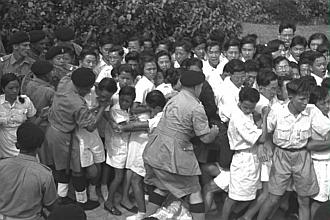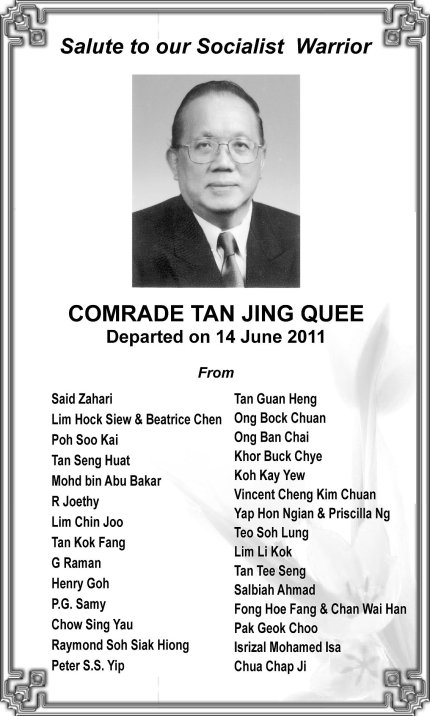May 13 generation shares its stories
By Leong Weng Kam, Senior Writer, Straits Times, 19 June 2011
Former Singapore political detainee Tan Jing Quee, who was battling cancer, was promoting his latest book up to the last days of his life.
He had been across the Causeway last month, in Kuala Lumpur and Penang, to launch The May 13 Generation, an essay collection on the Chinese middle school student movement in Singapore in the 1950s, which he co-edited.
Mr Tan, 72, returned home ill on May 25, and was admitted to Singapore General Hospital a week later. He died just five days ago.
The retired lawyer and former Barisan Sosialis politician, detained under the Internal Security Act for alleged pro-communist activities soon after his failed bid at the 1963 General Election, was cremated at Mandai Crematorium yesterday.
Released in 1966, he went to London to study law and returned in 1970 to practise till he retired about 10 years ago.
His two co-editors – Professor Emeritus Tan Kok Chiang, 74, a former Chinese middle school student leader; and Dr Hong Lysa, 58, a historian – were also at the book launches in Malaysia.
Recalling their trip, Prof Tan who now lives in Ontario, Canada, said: ‘I could see Jing Quee feeling the pressure of long distance travel. But his spirits were very high, meeting friends and comrades whom he had not seen for a while.’
Mr Tan’s wife, Rosemary, 65, said her husband of 40 years had wanted to go on the journey very much, to meet his many old friends in Malaysia, including former politician Lim Kean Chye, as well as to launch the book which took him two years to do.
In an interview he gave to The Straits Times and Lianhe Zaobao following the book’s earlier launch in Singapore, also last month, he said the idea for the collection came when he was translating the Chinese novel Ju Lang (Mighty Wave), by leftist writer Lim Kim Chuan, into English two years ago.
Helping him with the translation was Dr Hong and another former political detainee and Barisan MP, Madam Loh Miao Gong, 76, who was arrested after the 1963 polls for alleged pro-communist activities.
Ju Lang, set in Singapore in the 1950s, was first published in Chinese in 2004 to mark the 50th anniversary of the mass anti-colonial movement started after Chinese middle school students had clashed with riot policemen.

On May 13, 1954, students clashed with riot policemen while on their way to hand a petition for exemption from conscription to the Governor. -- ST FILE PHOTOS
The students were on their way to hand their petition for exemption from conscription to the then Singapore Governor at the former Government House, now the Istana, on May 13, 1954.
The novel’s English translation was launched as a companion volume to The May 13 Generation, which also has a Chinese edition.
‘Halfway through our translation, we felt a novel may not appeal to younger readers and it may not be able to highlight the significance of the historical event. So we started to invite scholars and those involved in the May 13 incident to write essays and their recollections,’ Mr Tan recalled during the interview last month before his death.
He had been actively researching, writing and editing books on Singapore’s leftist history for the past 10 years.
His last effort was The May 13 Generation, comprising 15 essays which include those on the arts in the 1950s. The preface, introduction and first four chapters were written by Mr Tan, Dr Hong and researcher Khe Su Lin.
In their essays, they gave the social and political background, examined the historical framework and explained the context of the period in which the Chinese middle school student movement was inspired and later grew.
The students formed a united, open and legal movement, the Singapore Chinese Middle School Students’ Union (SCMSSU), a year after the May 13 incident but it was banned barely a year later by the colonial government for engaging in pro-communist activities.
Former prime minister Lee Kuan Yew, a young Cambridge-trained lawyer then, was SCMSSU’s legal counsel.
It was through the students that Mr Lee got to know young Chinese-educated leftist trade unionists like Fong Swee Suan and rural dwellers’ association leaders such as Chan Chiaw Thor. Together with other like-minded people, including several of Mr Lee’s English-educated friends, they secured a mass base for a political party and formed the People’s Action Party (PAP) in November 1954.
It was student support that helped the PAP win the municipal and legislative elections in the 1950s, leading to its landslide election victory in 1959 when it became the ruling party.
Many scholars have said that PAP and the Singapore story would have turned out quite differently if not for the May 13 incident.
Former leftists and alternative history writers often said the role and significance of the student movement were insufficiently told in the dominant, official narrative.
‘This volume, The May 13 Generation, marks the breaking of that silence,’ said Prof Tan, who was SCMSSU’s English secretary when he was a Chung Cheng High student in the 1950s.
Prof Tan, a graduate of the former Nanyang University in 1960 who later left for his postgraduate studies overseas, is among those who have broken their silence. He wrote about his involvement in the student movement for the first time after nearly 60 years in the chapter, My Story, in the book.
Also sharing her story for the first time is Madam Loh, who was among the arrested students when the colonial government cracked down on them on Oct 10, 1956. Her chapter is entitled The Two Faces Of Men In White.
Other contributors include retired lawyer Lim Chin Joo and former Barisan MP Lim Huan Boon.
‘The telling of the story of the Chinese middle school students of the 1950s now begins,’ said Prof Tan.
The May 13 Generation and the English translation of Mighty Wave are available at Select Books for $34.25 and $28.46 each respectively. – ST







